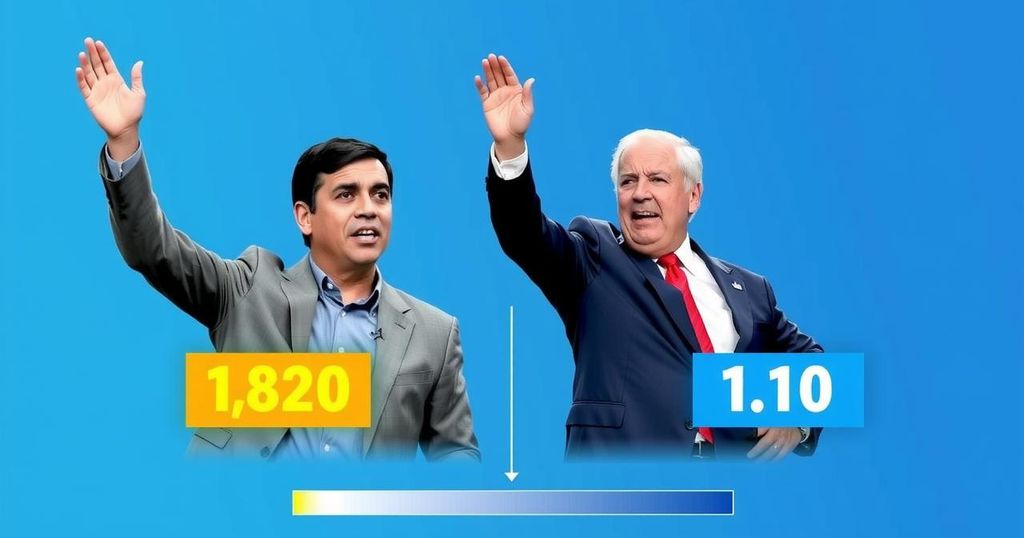Uruguay’s Presidential Runoff: A Dead Heat Between Delgado and Orsi
Uruguayans voted in a runoff election with Álvaro Delgado from the National Party and Yamandú Orsi from the Broad Front in a close contest. Following a first round where the Broad Front led, this election highlights public concerns about crime and economic policies. With both candidates lacking a strong anti-establishment narrative, voter indecision remains high as they appeal for support amidst a backdrop of historical political stability.
On Sunday, Uruguayans participated in a critical second round of voting to elect their next president, as the conservative ruling party faced off against the left-leaning Broad Front coalition in a tightly contested runoff. The contentious election emerged after both parties failed to secure an outright majority in the first round held on October 27, where the Broad Front garnered 44% of the votes compared to 27% for the incumbent National Party candidate Álvaro Delgado. The political landscape is further complicated by support from other conservative parties, particularly the Colorado Party, which achieved a collective 20% of the vote, bolstering Delgado’s position.
This election marks an unusual occurrence characterized by a notable absence of anti-establishment fervor typically observed in similar elections across the globe. Analysts attribute the widespread indecision and voter apathy to the candidates’ subdued campaigns and the shared consensus on pivotal issues such as social spending and income inequality. “The question of whether Frente Amplio (the Broad Front) raises taxes is not an existential question, unlike what we saw in the U.S. with Trump and Kamala framing each other as threats to democracy,” remarked Nicolás Saldías, a senior analyst at the Economist Intelligence Unit.
Both candidates strive to address rising public concerns regarding violent crime, a significant issue for a nation historically viewed as among the safest in the region. Delgado promotes a stringent approach to crime, including plans for a maximum-security prison, whereas Orsi emphasizes community-based prevention strategies. Delgado, a 55-year-old rural veterinarian and veteran of the National Party, positions his campaign as a continuation of the successful policies instituted by current President Luis Lacalle Pou, who is constitutionally barred from seeking a second term.
Conversely, Yamandú Orsi, a 57-year-old former educator and past mayor, is seen as a successor to former President José “Pepe” Mujica, who ushered in significant social reforms during his tenure. Orsi aims to implement modest changes focusing on attracting investment and proposing social security reforms without enacting sweeping alterations that labor unions advocate. The recent defeat of a plebiscite to increase pension payouts underscores the electorate’s preference for fiscal restraint.
Uruguay’s political dynamics reflect a robust democratic framework, as evidenced by the orderly nature of this election cycle. The outcome of this runoff will not only influence the direction of the nation’s policies but will also set the tone for future governance. As José Mujica aptly noted, the necessity for negotiation amidst a divided Congress is indicative of Uruguay’s democratic resilience, signifying a positive narrative amidst a changing political landscape in Latin America.
The context of Uruguay’s presidential election reveals a significant transition since the Broad Front coalition governed for 15 years until their defeat in 2019, which has prompted the current close race. The July elections indicated a shift in public sentiment, particularly regarding issues of social justice, economic management, and growing crime concerns, suggesting a more engaged electorate. This election, characterized by vigorous competition, is a pivotal moment for a nation known for its democratic practices and political stability in South America.
In conclusion, Uruguay’s presidential runoff epitomizes a pivotal moment in the nation’s democratic process, presenting voters with stark choices amidst a backdrop of rising crime and economic challenges. Both candidates represent diverse approaches to governance, reflecting the shifting priorities of the electorate. As the nation navigates these crucial decisions, the outcome of this election will likely shape Uruguay’s socio-economic landscape and political climate for years to come.
Original Source: www.voanews.com




Post Comment